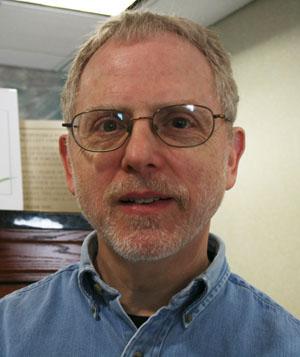
By Barb Arland-Fye
Father Paul Turner gave participants at last week’s fall clergy gathering a better understanding of how and why the book of prayers that priests use at Mass is undergoing a new English translation.
Fr. Turner is intimately familiar with the translation process as a facilitator for the International Commission on English in the Liturgy, in addition to his roles as a pastor in Missouri, theologian and published author.
While he described himself as a note-taker for the commission, his knowledge of the subject matter and his engaging presentation style put a number of participants at ease about the changes that are coming in the next year or so.
Organizers of the clergy gathering invited lay leaders from throughout the Davenport Diocese to the first day of Fr. Turner’s presentation as a way to begin preparing for the first major revision in translation for English-speaking Catholics in 40 years. The U.S. bishops are voting this month at their fall meeting on the final installments, which still require approval from the Vatican.
These lay leaders “will be going back to their parishes with hopefully some enthusiasm about the changes,” said Msgr. John Hyland, vicar general for the Davenport Diocese. “I think after listening to Fr. Turner’s presentation, people were impressed. I think he encouraged all the clergy, religious and laity present. If I were in a parish, I think I could go back with enthusiasm and do the catechesis before the new Roman Missal is implemented.”
Sister Bea Snyder, CHM, director of the Humility of Mary Center in Davenport, thought beforehand that the presentation might be dull and uninspiring. Fr. Turner’s presentation convinced her otherwise.
“He was so knowledgeable; he kept things moving, and he had a good sense of humor. I thought it was a very enlightening presentation,” she said.
Whatever apprehension she had about the coming changes has been alleviated. “Yes, it’s going to be different, but we’ll survive. It’s nothing so drastic that it’s going to shock all of us,” she said.
Sr. Snyder attended to become better informed and to “show appreciation to the clergy for providing an opportunity for religious and lay people involved in parishes to take part. That it was opened up to us and not just the priests, I thought that was a very good move on the part of the diocese.”
Sister Paschal Hocum, OSF, also was impressed by Fr. Turner’s knowledge of the translation process. “It gave a lot of credence to what he’s saying. He was certainly wonderful in that respect. His manner of presentation was very good.”
But Sr. Hocum, a former vice president of the Clinton Franciscans, says she still wonders why a new translation is necessary. One concern she has is changing the word “We” to “I” in the Nicene Creed. “God lives in relationship and community in the Trinity, so we need to come in community as ‘we,’ not ‘I,’” she added.
She also has concerns about the emphasis on the formal correspondence approach vs. the dynamic equivalence approach to language. Unlike Latin, “English is not a Romance language — it’s a Germanic language. So a lot of those formalities of Latin are kind of aristocratic,” she observed.
Father Paul Appel, pastor of St. James Parish in Washington, said: “I thought Fr. Turner did a good job of explaining why the changes were done and just how carefully they were considered. I think that some people believe the changes are arbitrary, only changed because someone feels like it. It was clear that the bishops spent a lot of time working on making our prayers that much better.”
Fr. Appel said he has “enough information now to go back to my parish and begin to explain some of the upcoming changes … simply having some of the prayers in hand is very helpful when it comes to explaining the changes.”
Father Stephen Page, pastor of St. Mary Parish in Fairfield, said the message Fr. Turner shared was consistent with the message delivered by other speakers during a seminar last summer at St. John’s University in Collegeville on the translation’s impact on music.
“There will be some far-reaching benefits for everybody and some things we cherish that we’ll miss,” Fr. Page observed of the translation changes. He said Fr. Turner provided details demonstrating that translators have been hard at work to maintain the essence of the language the English-speaking church has grown accustomed to since Vatican II.
One of the points Fr. Turner emphasized is that although some of the prayers and responses are changing, the Mass itself is unchanged.
“It’s like a couple with a huge family,” Fr. Page said. “They’ve raised the first set of kids one way. Now they’re fine-tuning it for the other ones. It’s still the same family and still the same parents.”








